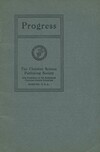

Are you sure?
This bookmark will be removed from all folders and any saved notes will be permanently removed.
Love's Sufficiency
THERE are few passages in Mrs. Eddy's writings which have awakened more interest or begotten more inquiring thought than that which affirms that "divine Love always has met and always will meet every human need" (Science and Health, p. 494). The questioning referred to has grown, for the most part, out of the failure of those who, though sincere and earnest in their attempted demonstration of health, or the supply of other needs, have not effectively related this sentence to the succeeding and correlated words of the paragraph in which it is found. Mrs. Eddy goes right on to say, "It is not well to imagine that Jesus demonstrated the divine power to heal only for a select number or for a limited period of time, since to all mankind and in every hour, divine Love supplies all good."
Reading the statement as a whole, it is to be seen that Love, as here used, includes very much more than mere kindly disposition. As commonly used, the word love often stands simply for the selfish, monopolistic impulses of kinship. Upon a higher plane it conveys the thought of affectionate good will, of all those noble impulses in which human brotherhood is grounded. It speaks for genuine unselfishness, for true devotion. Upon a yet higher plane it stands for glad and obedient response to divine Truth. The word when capitalized, however, surely embraces very much more than all these nobler meanings. It signifies not only quality but substance, the spiritually creative and corrective energy and efficiency; it is the God who is Love and is the "divine power to heal" which "supplies all good;" and the relations of this understanding of the term in Christian Science to human life are at once recognized as of vital significance. That Love can and does measure up to the demand of every human need, is now clearly seen.
Christ Jesus demonstrated God as Love, and in many sayings sought to convey the thought of His brooding nearness. The sense of personal relationship, that of a parent to a child, has thus obtained in all Christian teaching about God. Nevertheless, the greater part of the Christian world has not got beyond the thought of love as expressing good disposition, unselfish impulsion, compassionate regard. Christian Science deepens and solidifies the thought into that of entity, the heart of being. Love and power are thus identified as one and the same, and the far-reaching significance of this fact is found in the realization that it has immediately to do with the solution of out every problem. The moment one begins to think of spiritual love as reflecting divine power, that moment, as never before, he can but recognize his own ability to do, to bring right things about, since consciousness always gives such definite and unquestionable testimony as to our ability to love nobly, if we will. In the fourth chapter of I John this awareness is constantly assumed, and the knowing that we love God is affirmed to be the proof of our right knowledge of God. The apostle further declares that the question of our love for and our at-one-ment with God, is to be determined by the sincerity of our love for our brother man, concerning which we can be entirely sure, so that our relation to God may be correspondingly free from all uncertainty. "Every one that loveth," says John, "is born of God, and knoweth God. . . . If we love one another, God dwelleth in us, and his love is perfected in us." The relation of love for our fellow man to love for God, so that His love is "perfected in us,"—grows more and more wonderful as one thinks of it, and the possible sequences of the fact are simply stupendous.
Enjoy 1 free Sentinel article or audio program each month, including content from 1898 to today.
JSH Collections
This article is included in:
1921 - PAMPHLET
Progress
JSH-Online has hundreds of pamphlets, anthologies, and special editions for you to discover.
June 12, 1920 issue
View Issue-
Love's Sufficiency
JOHN B. WILLIS
-
Light
ROSE N. SUTRO
-
The Interpreter
MARTIN WACHS
-
Facts
DORA A. DILLON
-
One Government
JACOB A. REID
-
The Unity of the Faith
E. CAROLINE DUTTON
-
Trusting
SARAH A. WILLIAMS
-
In a recent issue there appears the following statement,...
Charles W. J. Tennant
-
City of God
MARY E. COBB
-
Law and Its Counterfeit
Frederick Dixon
-
Convergence
Gustavus S. Paine
-
The Lectures
with contributions from Bicknell Young , Ralph O. Brewster, Christine Paulson, Jerome B. Burbank, Charles F. Southworth, Laurene Hook, Ben Fitzpatrick, Willietta McCraken, J. H. Henderson, Bessie Turner Allen
-
We read in Deuteronomy, "The eternal God is thy...
Arthur W. Walter
-
I should like to express in some measure my gratitude...
Sonia V. M. Dougherty
-
It is now four years since I began the study of Christian Science
Abbie E. Higgins
-
For many months the Christian Science Sentinel has...
Sarah K. Johnson
-
Since the birth of my now ten-year-old son I suffered...
Agnes Schuster
-
I wish to express my gratitude for a knowledge of Christian Science,...
W. Colin Smith with contributions from W. Colin Smith
-
In the year 1914 we adopted a baby boy three weeks...
Lina L. Rathbun
-
It is with a heart full of gratitude to Mrs. Eddy, the...
Alberta R. Mitchell
-
Signs of the Times
with contributions from Robert Hopkin



